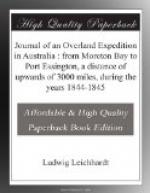About three miles to the westward of our camp, the water ceased, and the creek formed a dry sandy bed, covered with Casuarinas; it was joined by two Pandanus creeks with steep deep channels, and well provided with water-holes. I had to go down the creek four miles, in order to avoid some steep rocky ranges; but we turned afterwards to the northward, and travelled, over an open well-grassed country, to the river: it was, however, full of melon-holes and very stony. Ranges and high rocky ridges were seen in every direction. From one of them a pillar of smoke was rising, like a signal fire. The extensive burnings, and the number of our sable visitors, showed that the country was well inhabited. About four or five miles from the last creek,—which I shall call “Hodgson’s Creek,” in honour of Pemberton Hodgson, Esq.—the river divided into two almost equal branches, one coming from the northward, and the other from north-west by west. I named the river from the northward the “Wilton,” after the Rev. Mr. Wilton of Newcastle, who kindly favoured my expedition. Its latitude was about 14 degrees 45 minutes.
About three miles above the junction of the Wilton with the Roper, we again encamped on the steep banks of the latter, at a spot which I thought would allow our horses and cattle to approach in safety. One unfortunate animal, however, slipped into the water, and every effort to get him out was made in vain. Its constant attempts to scramble up the boggy banks only tired it, and as night advanced, we had to wait until the tide rose again. I watched by him the whole night, and at high water we succeeded in getting him out of the water; but he began to plunge again, and unfortunately broke the tether which had kept his forequarters up, and fell back into the river. At last I found a tolerable landing place about fifty yards higher up; but, as I was swimming with him up to it, and trying to lead him clear of the stumps of trees, he became entangled in the tether rope by which I guided him, rolled over, and was immediately drowned. This reduced our number of horses to nine. When the other horses were brought to the camp, another rushed into the water, but I swam with him at once to the good landing place, and we succeeded in saving him.




